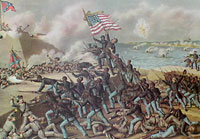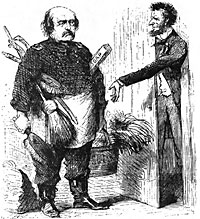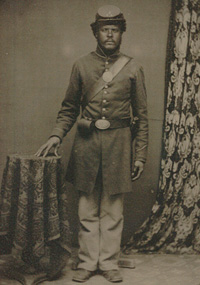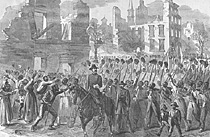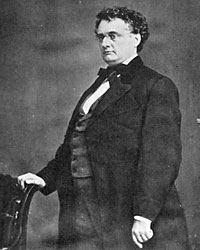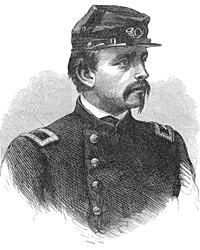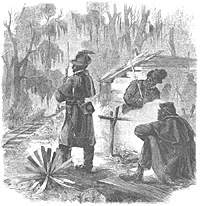
Pickets of the First Louisiana “Native Guard” Guarding the New Orleans and the Great Western Railroad
“Despite the service of black soldiers in the Revolution and the War of 1812, Negroes had been barred from state militias since 1792 and the regular army had never enrolled black soldiers. The prejudices of the old order died hard. Lincoln had squelched Secretary of War Cameron’s reference to arming slaves in December 1861, and the administration refused at first to accept the organization of black regiments in Kansas, occupied Louisiana, and the South Carolina sea islands during the summer of 1862,” wrote historian James M. McPherson.1
Because Louisiana was one of the Union’s first strongholds in the Deep South and because there were many free blacks in New Orleans, it became a natural focal point for the recruitment and deployment of black troops under General Benjamin Butler, the military governor. According to historian Dudley Taylor Cornish, “Ben Butler in May [1862] placed a low estimate on the value of Negroes as soldiers. In his customary discursive fashion he gave the secretary of war the benefit of his expert opinion formed after a month in Louisiana. The Negro there, Butler wrote, ‘by long habit and training has acquired a great horror of fire-arms, sometimes ludicrous in the extreme when the weapon is in his own hand.'”2
Back in Washington, the prejudice against black troops was very slowly dissolving. Some Louisiana residents were upset by the actions being taken by General Butler, and his subordinate, General John W. Phelps, in dealing with escaped slaves. At the end of July 1862, Illinois Senator Orville H. Browning went to President Lincoln’s office and “read him a letter I had received from Bullitt of New Orleans complaining of Genl Phelps Administration of affairs and saying that all the union sentiment there was crushed out[.]
He told me he had one from Reverdy Johnson to the same effect, and read me his reply to it. He said the people there were making false pretences – that there was but little union sentiment – that they wanted the government to protect them, their property, and institutions whilst they sympathized with and aided treason and rebellion – that it should not be done. If they were tired of Genl Phelps administration they knew how to get rid of it by returning to their allegiance and submitting to the authority of the government, and if they did not do so, and he could send any heavier scourge upon them than Genl Phelps they had better be looking out for it.”3 President Lincoln wrote newly elected Maryland Senator Reverdy Johnson, who was in Louisiana on a mission for the State Department:
Yours of the 16th by the hand of Governor [George W.] Shepley is received. It seems the Union feeling in Louisiana is being crushed out by the course of General Phelps. Please pardon me for believing that is a false pretense. The people of Louisiana all intelligent people everywhere know full well, that I never had a wish to touch the foundations of their society or any right of theirs. With perfect knowledge of this, they forced a necessity upon me to send armies among them, and it is their own fault, not mine, that they are annoyed by the presence of General Phelps. They also know the remedy know how to be cured of General Phelps. Remove the necessity of his presence. And might it not be well for them to consider whether they have not already had time enough to do this? If they can conceive of anything worse than General Phelps, within my power, would they not better be looking out for it? They very well know the way to avert all this is simply to take their place in the Union upon the old terms. If they will not do this, should they not receive harder blows rather than lighter ones?
You are ready to say I apply to friends what is due only to enemies. I distrust the wisdom if not the sincerity of friends, who would hold my hands while my enemies stab me. This appeal of professed friends has paralyzed me more in this struggle than any other one thing. You remember telling me the day after the Baltimore mob in April 1861, that it would crush all Union feeling in Maryland for me to attempt bringing troops over Maryland soil to Washington. I brought the troops notwithstanding, and yet there was Union feeling enough left to elect a Legislature the next autumn which in turn elected a very excellent Union U. S. Senator!
I am a patient man always willing to forgive on the Christian terms of repentance; and also to give ample time for repentance. Still I must save this government if possible. What I cannot will not do; but it may as well be understood, once for all, that I shall not surrender this game leaving any available card unplayed.4
Phelps’ behavior was also causing problems with his superior, General Banks. According to historian Joseph T. Glatthaar, “Phelps, a West Pointer and an abolitionist, viewed the enlistment of blacks as both a military and a social necessity. Phelps believed blacks could offset the Federal manpower shortage in the area, and the military structure would be a useful tool to facilitate the transition of blacks from slavery to freedom when the inevitable collapse of Southern society occurred.”5 Phelps took an aggressive role in recruiting blacks to the Union cause. Butler recalled in his memoirs that General Phelps “had a great number of escaped slaves in and about his camp. Sometime before that, he had asked me to permit him to organize them into military companies and drill them and furnish arms and equipments for them. I had told him it was impossible, because it was against the direct order of the President, who had just disbanded some negro troops organized by Hunter, and because the arms and equipments sent me were especially reserved for white troops only. Only he replied that he was not fit for slave-driving or slave-catching, and declined to obey my orders.”6
According to Butler biographer Dick Nolan: “From his voluminous correspondence on the subject, it is apparent that Phelps had grand visions for his enterprise. He has in mind dispatch the first of his graduates to South Carolina for active service, while in effect establishing at Camp Parapet a military training school for further Negroes enlistees. Operating in plantation country, Phelps found ample scope for his role as liberator, which he undertook with the kind of zeal that had motivated mad John Brown. In fact, the hysterical tone of his correspondence with headquarters strongly suggested that his nerves had been stretched taut ant thin and that he was not quite rational anymore on the subject of slavery. Phelps found kindred spirits among his men, who undertook raids on plantation houses to carry off slaves to the shelter of the Federal camp. This led to many complaints from planters, demanding that Butler rein in his subordinate general and curb the activities of his troops.”7
Butler laid the blame for his growing estrangement with his subordinate over the use of black soldiers at Phelps’ feet: “I loved General Phelps very much. He was a crank on the slavery question solely; otherwise he was as good a soldier and commander as ever mounted a horse. I reasoned with him in every way. I showed him that Congress had just passed an act that forbade military companies to employ negroes, and now that we were at liberty to employ them, I wished he would go forward. I begged him to do so, but he answered very decisively that he would not. Before this he had me a very long, eloquent, able, and well-put argument in favor of our negroes as troops, requesting that I forward it to the President, which I did. If I had not been of his opinion before, I should have been fully convinced by that argument.”8 New Orleans-based George Denison wrote his boss, Secretary of the Treasury Salmon P. Chase: “Gen. Butler’s opposition to the enlistment of negroes by Gen. Phelps was not a matter of principle. Gen. Phelps had the start of him, while Gen. B. wanted the credit of doing the thing himself, and in his own way. And he is doing it, shrewdly and completely, as he does everything.”9
Butler biographer Nolan wrote: “Washington dithered. When no response was received after more than a month had passed, Phelps decided that this official silence gave consent to his policy. He proceeded to request arms, ammunition, uniforms, and camp equipment for his Negro troops. Butler had received unofficial reports of Phelps recruiting activities and had kept aloof. But not it became a matter of official record, and Butler was compelled to take official notice. He refused to equip Phelps’s black units, reminding his subordinate that he had no authority to do so.”10
On August 21 1862, General Phelps resigned after Butler wrote him that “I could not, where there was no sufficient emergency, act against the orders I had received from my superior.”11 On August 22, the military commander of the region, General Benjamin Butler, issued General Order No. 63 to enlist colored volunteers, known as the Native Guards. At almost the same time, blacks were officially accepted into the Southern Department of the Union Army under an order by Secretary Stanton to General Rufus Saxton. Historian Dudley Taylor Cornish wrote in The Sable Arm: Black Troops in the Union Army, 1861-1865, “Butler was careful to make clear in his order of August 22 that it applied only to ‘a military organization, known as the ‘Native Guards’ (colored),” which had been ‘duly and legally enrolled as part of the militia” of Louisiana in the spring of 1861, ‘its officers being commissioned by Thomas O. More, Governor and commander-in-chief of the militia of the State of Louisiana.” Thus, by a technicality, Butler escaped for a time the opprobrium of having armed ‘slaves.’ So successful was this piece of Butler shrewdness that even the National Intelligencer on September 5 published his order with no comment beyond the introductory statement that ‘Gen. Butler, having discovered that the present Governor of Louisiana had organized a body of free negroes as soldiers in the service of the Confederate States, has issued an order inviting them into the service of the United States…”12
By early September, Butler could report to Stanton on his recruiting efforts in Louisiana: “I shall also have within ten days a Regiment 1000 strong of Native Guards (Colored), the darkest of whom will be about the complexion of the late Mr. Webster.” The 1st Regiment Louisiana Native Guards were officially mustered in on September 27.”13 By early October, a New York Times reporter observed that the Native Guards bore “their bayoneted muskets proudly, marching down Camp Street, in charge of some half-dozen prisoners of their own color. As trifling as these things appear to the superficial observer, they really mark momentous eras in the history of this revolution.”14
In December 1862, General Nathaniel Banks succeeded Butler in New Orleans and took on Butler’s black recruiting project. Meanwhile, Daniel Ullmann, a New York attorney and politician, had gone to the White House in October 1862 to urge “upon him the overruling necessity of arming the liberated slaves.” Ullman said he told the President “You arm the Blacks, and enlist them into the Armies of the United States.” Mr. Lincoln responded that such a policy “would drive many of our friends from us. The people are not prepared for it.” Ullman responded: “I am by no means sure of that, Mr. President…besides, events, now-a-days, follow each other in such quick succession, and public opinion changes with such astounding rapidity, that, in these great exigencies, it appears to me, the path of duty is sometimes to lead as well as to follow…pardon a man just out of a Rebel prison for being strenuous on this point….As I laid [sic] sick in Libby, I resolved that, if my life was spared, and I ever had opportunity, I would, again, to the utmost of my ability, press this course upon you.'”15
Although Ullmann was not persuasive in October, Vice President Hannibal Hamlin helped get authorization for Ullmann (and Hamlin’s son Cyrus) to engage in recruiting in January 1863. Young Captain Hamlin along with several colleagues visited his father in January 1863. The Vice President took the group of officers to the White House the next day to present their case for recruiting black soldiers to the President. Mr. Lincoln responded: “Gentlemen, I say to you freely that your visit has determined me finally to do what my dear friend Hamlin has urged me to do, – to arm the blacks, and I will write an order to the Secretary fo War to form such an organization as may be necessary at once.”16
Ullman’s elevation to general followed. According to historian Cornish, “The new general, the first to owe his star to the new Union policy, opened headquarters in New York city and began the hard work of organizing the cadre of his Louisiana brigade. His initial optimism was somewhat dampened by the discovery that, contrary to his October feeling, public opinion was ‘far from being ripe on the subject’ of Negro soldiers.”17
President Lincoln sent instruction to General Banks in late March 1863: “Hon. Daniel Ullmann, with a commission of Brigadier General, and two or three hundred other gentlemen as officers, goes to your department and reports to you, for the purpose of raising a colored brigade. To now avail ourselves of this element of force, is very important, if not indispensable. I therefore will thank you to help Gen. Ullmann forward with his undertaking, as much, and as rapidly, as you can; and also to carry the general object beyond his particular organization if you find it practicable. The necessity of this is palpable if, as I understand, you are now unable to effect anything with your present force; and which force is soon to be greatly diminished by the expiration of terms of service, as well as by ordinary causes. I shall be very glad if you will take hold of the matter in earnest.”18
Historian Dudley Taylor Cornish wrote: “Banks was in a peculiarly advantageous location for taking hold of the matter in earnest and with good results. Louisiana, of all the slave states under partial or total Union control, had the largest number of male slaves between the ages of eighteen and forty-five – 75,548 – in addition to 3,205 free colored men in the same military age group. The arming of Negroes had won its first successes in Louisiana, and on February 12, 1863, Banks reported to the War Department that he had some 3,251 Negro troops enrolled in his command. In addition to the three regiments of Native Guards mustered by Ben Butler in the fall of 1862, Banks disclosed that a company of artillery had been organized and that a fourth regiment of infantry was ‘progressing favorably.'”19
In a letter to General Henry W. Halleck in late May 1863, General Nathaniel Banks reported on recent operations by his troops in the siege of Port Hudson in which black soldiers had participated: “On the extreme right of our line I posted the first and third regiments of negro regiments of negro troops. The First regiment of Louisiana Engineers, composed exclusively of colored men, excepting the officers, was also engaged in the operations of the day. The position occupied by these troops was one of importance, and called for the utmost steadiness and bravery in those to whom it was confided.”
Banks added: “It gives me pleasure to report that they answered every expectation. Their conduct was heroic. No troops could be more determined or more daring. They made, during the day, three charges upon the batteries of the enemy, suffering very heavy losses, and holding their position at nightfall with the other troops on the right of our line. The highest commendation is bestowed upon them by all the officers in command on the right.”20
Secretary of State William H. Seward testified to the bravery of these black soldiers: “As the national armies advanced into the insurrectionary territories, slaves in considerable numbers accepted their freedom and came under the protection of the national flag. Amidst the great prejudices and many embarrassments which attend a measure so new and so divergent from the political habits of the country, freedmen with commendable alacrity enlisted in the Federal army. There was in some quarters a painful inquiry about their moral capacity for service. That uncertainty was brought to a sudden end in the siege of Port Hudson. The newly sudden end in the siege of Port Hudson. The newly raised regiments exhibited all necessary valor and devotion in the military assaults which were made. With desperate courage, and not without fearful loss, by General Banks.”21
Meanwhile, in Banks’ home state, efforts had long been underway to recruit and deploy two black regiments. “Many Massachusetts men believed that their Commonwealth, so long in the forefront of the abolitionist movement, ought to be the first of the Northern states to send an Africa-American regiment into the field,” wrote historian Russell F. Weigley. “Governor Andrew envisaged the forming of a black Massachusetts regiment as the crowning achievement of his tenure, and in January 1863 [Secretary of War Edwin M.] Stanton authorized him to attempt to do it. The War Secretary assured the governor that black soldiers would receive equal treatment with whites in all matters relating to pay and status.”22
Governor Andrew lacked social grace or political judgment. His appearance was distinctly unmilitary but his attitude was determinedly militaristic. Historian Allen Nevins noted: “Nearly everybody had a high regard for Andrew’s gifts. This aggressive, generous, choleric little man, the Miles Standish of the Bay State, had proved far-sighted, fearless, and unwearied. To be sure, his judgment was erratic, for he was emotional and impulsive; he was tactless, and his fierce bluntness made many enemies. He liked to write fiery letters about the sins of Ben Butler and other opponents, and declaim them aloud to everybody within earshot. His fits of impatience, his violent language, his exaggerated loves and hates, however, were easy to forgive, for he put a manly honesty into all his acts. Working day and night, seeing far ahead, and planning astutely, he made Massachusetts a pillar of strength for the Union. In spite of his own occasional weakness, a Websterian taste for drink, he was unquestionably the ablest of the war governors.”23
On January 15, 1863 Andrew received approval from the federal government to organize the first northern regiment of United States Colored Troops. Lincoln biographers John G. Nicolay and John Hay wrote: “The raising of negro soldiers in the free States, under State authority, became successful only in Massachusetts. Governor Sprague, of Rhode Island, asked for permission to raise a regiment as early as September 9, 1862. This, however, was before the Government adopted the policy; besides, the opinion of Governor Andrew, of Massachusetts, was: ‘It will be essential to the recruitment of the colored regiment commenced by Governor Sprague, that the colored population of other States shall contribute towards it, the number of persons of African descent in the State of Rhode Island alone being insufficient for the purpose.’ On January 20, 1863, the latter obtained authority from the Secretary of War for this object, and issued his own order of recruitment on February 7. Governor Andrew’s antislavery zeal prompted him to make this example as conspicuous and successful as possible by every care and attention which his own authority could supply.”24
The Bay State Governor was determined to raise a black regiment – despite the few numbers of free blacks in his own state from which to recruit and the necessity to concentrate recruitment in other Northern states. Andrew appointed a committee of prominent Massachusetts residents to raise and fund the new regiments. Blacks, like many whites, were initially reluctant to risk their lives. Historian James McPherson wrote: “There were several reasons for this. In the first place, the booming war economy had created full employment and prosperity for Negroes in some parts of the North….In the second place, there were hints from Confederate sources that captured Negro soldiers would not be treated as ordinary prisoners of war….In the third place, the authorization granted to Andrew by the War Department stipulated that all commissioned officers in the Negro regiment must be white men. Andrew wanted to grant a few commissions to qualified Negroes and give the opportunities for promotion, but Stanton and Lincoln feared the effect on Northern public opinion if black men became officers.”25
Failing in his effort to recruit black officers, Andrew sought to recruit model white ones. Andrew wrote: “I am desirous to have for its officers – particularly its field officers – young men of military experience, of firm anti-slavery principles, ambitious, superior to a vulgar contempt for color, and having faith in the capacity of colored men for military service. Such officers must necessarily be gentlemen of the highest tone and honor.”26 Governor Andrew sent recruiters far and wide in search of possible recruits but stuck close to home in recruiting a 26-year-old Harvard dropout, Captain Robert Gould Shaw, to be the regimental commander.
Historian William Seraile wrote that “Frederick Douglas noted in an editorial, ‘Men of Color, to Arms!’ that Massachusetts welcomed black recruits from the Empire State. On March 14, the Rev. J.W. C. Pennington of Hartford, Connecticut and William Wells Brown, fugitive slave, abolitionist and orator, urged blacks attending a mass meeting at Brooklyn’s Bridge Street African Methodist Episcopal Wesleyan church to join the colored Massachusetts regiment in formation.”27 Historian Dudley Taylor Cornish wrote “Governor Andrew knew what he wanted in the way of a regiment of Negro soldiers, and he lost little time in getting it. He wanted to make ‘a model for all future Colored Regiments,’ and he was convinced that, as the first Negro organization to be raised in the North, ‘its success or its failure [would] go far to elevate or to depress the estimation in which the character of the Colored Americans will be held throughout the World.'”28
Historian Cornish wrote: “After consulting with Stanton in early January, Andrew first considered the possibility of recruiting Negroes in North Carolina and even proposed Benjamin F. Butler, then at liberty, as the man to take up the work. But Butler, lately returned from Louisiana under something like a cloud, was out of favor with the War Department, and the proposal came to nothing. John Andrew, no man to let disappointments crush him, then asked for and received authority to raise colored troops in his own state. The National Republican of January 28 announced the granting of this authority as ‘the secret of the late mission of Gov. Andrew, Wendell Phillips, F.W. Bird, Dr. [Samuel Gridley] Howe, and a host of others of the radical school of politics in Massachusetts to this city, and [it] accounts for the[ir] many and frequent interviews with the president.'”29
Robert B. Edgerton noted in Hidden Heroism: Black Soldiers in America’s War one example of the diversity of the Massachusetts 54th: “Nicholas Said, who was born in Sudan of princely parents, amazed officers and men of the Fifty-fifth Massachusetts USCT by his ability to speak Arabic, Turkish, Mandra, and Russian in addition to his native Kanouri. He was also able to speak and write fluently in English, French, German, and Italian. The use of blacks as soldiers, whether former slaves or not, was not without Northern resistance, especially on the part of many white officers who believed that accepting command of such ‘inferior’ troops – who they feared would prove to be nothing more than laborers – would deprive them of glory and promotion. Nevertheless, some did so in search of money and rank, and others did so because they believed in black rights, even knowing that the Confederates were sworn to execute any white officer captured in command of black soldiers and on at least four occasions were known to have done so.30
Historian Dudley Taylor Cornish wrote: “Governor Andrew knew what he wanted in the way of a regiment of Negro soldiers, and he lost little time in getting it. He wanted to make ‘a model for all future Colored Regiments,’ and he was convinced that, as the first Negro organization to be raised in the North, ‘its success or its failure [would] go far to elevate or depress the estimation in which the character of the colored Americans will be held throughout the World.’ Within a few days after he had received Stanton’s order, Andrew had selected the regiment’s colonel, Robert Gould Shaw, then a captain in the 2nd Massachusetts Infantry, and its lieutenant colonel, Norwood P. Hollowell, a captain in the 20th Massachusetts.”31 Civil War writer Noah Andrew Trudeau wrote: “The 54th Massachusetts took shape at Camp Meigs, in the town of Readville, outside of Boston. Many who enlisted felt an enthusiasm akin to that at the start of a crusade. A black cabinetmaker from Philadelphia named George E. Stephens observed in a letter to the Anglo-African that the 54th would ‘reflect honor to our race, and…has become the representative of men of color in the North. James Henry Gooding, recruited from a New England whaler, wrote to the New Bedford Mercury in early March to assert, ‘Our people must know that if they are ever to attain to any position in the eyes of the civilized world, they must forgo comfort, love, fear, and above all, superstition, and fight for it….Consider that on this continent, at least, their race and name will be totally obliterated unless they put forth some effort now to save themselves.”32
On June 21, 1863, the 54th Massachusetts Regiment embarked for the Carolinas. The unit was destined to be immortalized by its assault on July 18, 1863 on Fort Wagner outside Charleston, South Carolina. A newspaper reporter who witnessed the attack on Fort Wagner wrote:
“The Signal given, our forces advanced rapidly towards the fort, while our mortars in the rear tossed their bombs over their heads. The Fifty-fourth Massachusetts led the attack, supported by the 6th Conn., 48th N.Y., 3rd N.H., 76th Penn. And the 9th Maine Regiments. Onward swept the immense mass of men, swiftly and silently, in the dark shadows of night. Not a flash of light was seen in the distance!…All was still save the footsteps of the soldiers, which sounded like the roar of the distant surf, as it beats upon the rock-bound coast.
“Ah, what is this! The silent and shattered walls of Wagner, all at once burst forth into a blinding sheet of vivid light…Down came the whirlwind of destruction along the beach with the swiftness of lightning! How fearfully the hissing shot, the shrieking bombs, the whistling bars of iron, and the whispering bullet struck and crushed through the dense masses of our brave men! I never shall forget the terrible sound of that awful blast of death, which swept down, shattered or dead, a thousand of our men. Not a shot had missed it aim.. Every bolt of steel, every globe of iron and lead, tasted of human blood…
In a moment the column recovered itself, like a gallant ship at sea when buried for an instant under an immense wave.
The ditch is reached; a thousand men leap into it, clamber up the shattered ramparts, and grapple with the foe, which yields and falls back to the rear of the fort. Our men swarm over the walls, bayoneting the desperate rebel cannoneers. Hurrah! the fort is ours!
But now came another blinding blast from concealed guns in the rear of the fort, and our men went down by scores. Now the rebels rally…They hurl themselves with fury upon the remnant of our brave band. The struggle is terrific. Our supports hurry up to the aid of their black comrades, but as they reach the ramparts they fire a volley which strikes down many of our men. Fatal mistake! Our men rally once more; but, in spite of an heroic resistance, they are forced back again to the edge of the ditch. Here the brave Shaw, with scores of his black warriors, went down, fighting desperately…
What fighting, and what fearful carnage! Hand to hand, breast to breast! Here, on this little strip of land, scarce bigger than the human hand, dense masses of men struggled with fury in the darkness; and so fierce was the contest that the sands were reddened and soaked with human gore.
But resistance was vain. The assailants were forced back again to the beach, and the rebels trained their recovered cannon anew upon the retreating survivors.
What a fearful night was that, as we gathered up our wounded heroes, and bore them to a place of shelter! And what a mournful morning, as the sun rose with his clear beams, and revealed our terrible losses! What a rich harvest Death had gathered to himself during the short struggle! Nearly two thousand of our men had fallen. More than six hundred of our brave boys lay dead on the ramparts of the fated fort, in its broad ditch, and along the beach at its base.33
Footnotes
- James M. McPherson, Battle Cry of Freedom, p. 563.
- Dudley Taylor Cornish, The Sable Arm: Black Troops in the Union Army, 1861-1865, .
- Theodore Calvin Pease, editor, Diary of Orville H. Browning, Volume I, 1850-1864, p. 564 (July 26, 1862).
- Abraham Lincoln Papers at the Library of Congress. Transcribed and Annotated by the Lincoln Studies Center, Knox College. Galesburg, Illinois. (Letter from Abraham Lincoln to Reverdy Johnson [Copy in John Hay’s Hand]1, July 26, 1862).
- Joseph T. Glatthaar, Forged in Battle: The Civil War Alliance of Black Soldiers and White Officers, p. 7-8.
- Benjamin Butler, Butler’s Book, Volume I, p. 488.
- Dick Nolan, Benjamin Franklin Butler: The Damnedest Yankee, p. 194.
- Benjamin Butler, Butler’s Book, Volume I, p. 488.
- Dudley Taylor Cornish, The Sable Arm: Black Troops in the Union Army, 1861-1865, p. 66.
- Dick Nolan, Benjamin Franklin Butler: The Damnedest Yankee, p. 195.
- Benjamin Butler, Butler’s Book, Volume I, p. 488.
- Dudley Taylor Cornish, The Sable Arm: Black Troops in the Union Army, 1861-1865, p. 66.
- Dudley Taylor Cornish, The Sable Arm: Black Troops in the Union Army, 1861-1865, p. 67 (Letter from Benjamin Butler to Edwin M. Stanton).
- Dudley Taylor Cornish, The Sable Arm: Black Troops in the Union Army, p. 68.
- Dudley Taylor Cornish, The Sable Arm: Black Troops in the Union Army, 1861-1865, p. 100.
- Charles Eugene Hamlin, The Life and Times of Hannibal Hamlin, p. 432.
- Dudley Taylor Cornish, The Sable Arm: Black Troops in the Union Army, 1861-1865, p. 101.
- Roy P. Basler, editor, The Collected Works of Abraham Lincoln, Volume VI, p. 154 (Letter to Nathaniel P. Banks, March 29, 1863).
- Dudley Taylor Cornish, The Sable Arm: Black Troops in the Union Army, 1861-1865, p. 102-103.
- Richard B. Harwell, editor, The Union Reader: As the North Saw the War, p. 353-354.
- Richard B. Harwell, editor, The Union Reader: As the North Saw the War, p. 212 (William H. Seward, “Secretary Seward’s Review of Recent Military Events”).
- Russell F. Weigley, A Great Civil War: A Military and Political History, 1861-1865, p. 187.
- Allan Nevins, The War for the Union: War Becomes Revolution, 1862-1863, p. 306.
- John G. Nicolay and John Hay, Abraham Lincoln: A History, Volume VI, p. 462-463.
- James M. McPherson, The Negro’s Civil War, p. 174.
- Joseph T. Glatthaar, Forged in Battle: The Civil War Alliance of Black Soldiers and White Officers, p. 37.
- William Seraile, New York’s Black Regiments During the Civil War, p. 21.
- Dudley Taylor Cornish, The Sable Arm: Black Troops in the Union Army, 1861-1865, p. 106.
- Dudley Taylor Cornish, The Sable Arm: Black Troops in the Union Army, 1861-1865, p. 105.
- Robert B. Edgerton, Hidden Heroism: Black Soldiers in America’s War, p. 26.
- Dudley Taylor Cornish, The Sable Arm: Black Troops in the Union Army, 1861-1865, p. 106.
- Noah Andre Trudeau, Like Men of War: Black Troops in the Civil War, 1862-1865, p. 73.
- Joseph T. Wilson, History of the Black Phalanx, p. 252-256.




